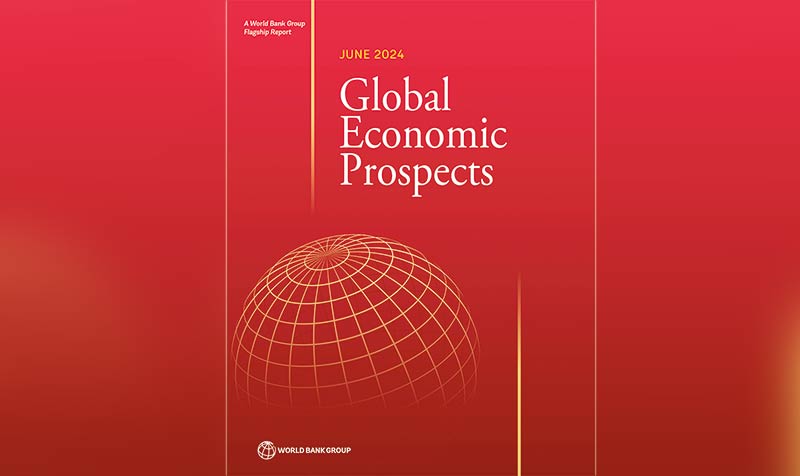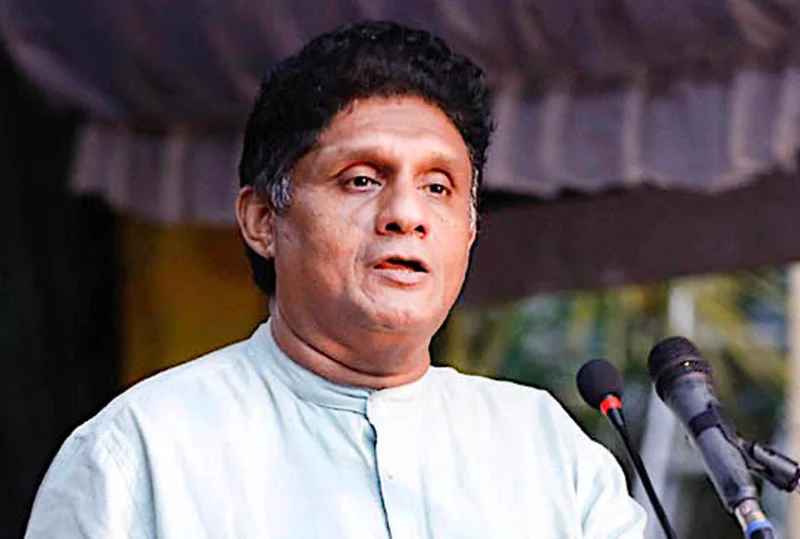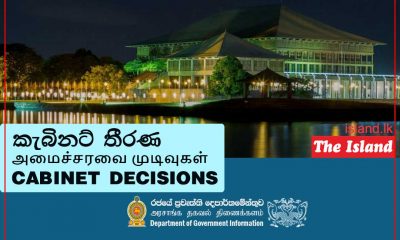News
World Bank forecasts 2.2% growth for Lanka in 2024, driven by tourism and remittance recoveries

The latest Global Economic Prospects report from the World Bank forecasts a 2.2 percent growth for Sri Lanka’s economy in 2024, marking a positive revision of 0.5 percentage points from January. This upward revision is attributed to gradual improvements in remittances and tourism.
The June edition of the World Bank’s Global Economic Prospects report highlights that tourism and remittances have rebounded following the economic contraction in 2023. However, both sectors remain below pre-pandemic levels.
The report states, “In Sri Lanka, the economy is expected to expand by 2.2 percent in 2024—a 0.5-percentage-point upward revision from January—supported by modest recoveries in remittances and tourism. Growth is projected to strengthen further in 2025-26, reaching 3 percent in 2026, assuming successful debt restructuring negotiations and the implementation of structural reforms, which would offset the adverse impact of planned fiscal consolidation on growth.
“After contracting in 2023, economic activity has strengthened in Sri Lanka, with tourism and remittances also recovering, although they have remained below pre-pandemic levels.
“The report also forecasts a slowdown in growth for the South Asia (SAR) region, from 6.6 percent in 2023 to 6.2 percent in 2024, mainly due to a moderation in India’s growth from recent highs. Regional growth is expected to remain steady at 6.2 percent in 2025-26, supported by stable growth in India. Among other economies in the region, Bangladesh is expected to maintain robust growth, albeit at a slower pace than in previous years, while growth is set to strengthen in Pakistan and Sri Lanka. However, the outlook is clouded by downside risks, including disruptions in commodity markets due to escalating conflicts, potential abrupt fiscal consolidations, financial instability from high bank exposure to sovereign borrowers, extreme weather events, and slower-than-expected growth in China and Europe. Conversely, upside risks include stronger-than-expected activity in the United States and faster global disinflation.
“Several factors have contributed to reductions in external imbalances, such as narrowed trade deficits, increased remittances, and tourism recoveries across multiple countries. Additionally, continued import restrictions, particularly in Bangladesh, have played a role. Foreign exchange reserves have risen in countries like Pakistan and Sri Lanka, reflecting eased currency pressures and increased official flows, although reserves remain low in some nations.
“In the SAR region, economic spillovers from outside are generally limited due to lower international trade openness compared to other global regions. However, weaker-than-projected growth in major trading partners could dampen growth in countries like Bangladesh, Pakistan, and Sri Lanka. For instance, a significant portion of intermediate goods imports in these countries comes from China, and any downturn in Chinese activity could lead to material shortages and reduced economic activity.
“Upside risks to regional growth include stronger-than-expected activity in the United States, which could stimulate growth in large exporting countries like Pakistan and Sri Lanka. Another potential upside is greater progress in global inflation reduction, potentially leading to faster-than-expected easing of monetary policy, lower borrowing costs, and improved growth prospects.”
News
Prez seeks Harsha’s help to address CC’s concerns over appointment of AG

Chairman of the Committee on Public Finance (CoPF), MP Dr. Harsha de Silva, told Parliament yesterday that President Anura Kumara Dissanayake had personally telephoned him in response to a letter highlighting the prolonged delay in appointing an Auditor General, a vacancy that has remained unfilled since 07 December.
Addressing the House, Dr. de Silva said the President had contacted him following the letter he sent, in his capacity as CoPF Chairman, regarding the urgent need to appoint the constitutionally mandated head of the National Audit Office. During the conversation, the President had sought his intervention to inform the Constitutional Council (CC) about approving the names already forwarded by the President for consideration.
Dr. de Silva said the President had inquired whether he could convey the matter to the Constitutional Council after their discussion. He stressed that both the President and the CC must act in cooperation and in strict accordance with the Constitution, warning that institutional deadlock should not undermine constitutional governance.
He also raised concerns over the Speaker’s decision to prevent the letter he sent to the President from being shared with members of the Constitutional Council, stating that this had been done without any valid basis. Dr. de Silva subsequently tabled the letter in Parliament.
Last week, Dr. de Silva formally urged President Dissanayake to immediately fill the Auditor General’s post, warning that the continued vacancy was disrupting key constitutional functions. In his letter, dated 22 December, he pointed out that the absence of an Auditor General undermines Articles 148 and 154 of the Constitution, which vest Parliament with control over public finance.
He said that the vacancy has severely hampered the work of oversight bodies such as the Committee on Public Accounts (COPA) and the Committee on Public Enterprises (COPE), particularly at a time when the country is grappling with a major flood disaster.
As Chair of the Committee responsible for overseeing the National Audit Office, Dr. de Silva stressed that a swift appointment was essential to safeguard transparency, accountability and financial oversight.
In a separate public statement, he warned that Sri Lanka was operating without its constitutionally mandated Chief Auditor at a critical juncture. In a six-point appeal to the President, Dr. de Silva emphasised that an Auditor General must be appointed urgently in the context of ongoing disaster response and reconstruction efforts.
“Given the large number of transactions taking place now with Cyclone Ditwah reconstruction and the yet-to-be-legally-established Rebuilding Sri Lanka Fund, an Auditor General must be appointed urgently,” he said in a post on X.
By Saman Indrajith
News
Govt. exploring possibility of converting EPF benefits into private sector pensions

The NPP government was exploring the feasibility of introducing a regular pension, or annuity scheme, for Employees’ Provident Fund (EPF) contributors, Deputy Minister of Labour Mahinda Jayasinghe told Parliament yesterday.
Responding to a question raised by NPP Kalutara District MP Oshani Umanga in the House, Jayasinghe said the government was examining whether EPF benefits, which are currently paid as a lump sum at retirement, could instead be converted into a system that provides regular payments throughout a retiree’s lifetime.
“We are looking at whether it is possible to provide a pension,” Jayasinghe said, stressing that there was no immediate plan to abolish the existing lump-sum payment. “But we are paying greater attention to whether a regular payment can be provided throughout their retired life.”
Jayasinghe noted that the EPF was established as a social security mechanism for private sector employees after retirement and warned that receiving the entire fund in a single installment could place retirees at financial risk, particularly as life expectancy increases.
He also cautioned that interim withdrawals from the EPF undermined its long-term sustainability. “Even the interim payments that are given from time to time undermine the ability to give security at the time of retirement,” he said, distinguishing the EPF from the Employees’ Trust Fund, which provides more frequent interim benefits.
Addressing concerns over early withdrawals, the Deputy Minister explained that contributors have been allowed to withdraw up to 30 percent of their EPF balance since 2015, with a further 20 percent permitted after 10 years, subject to specific conditions and documentary proof.
Of 744 applications received for such withdrawals, 702 had been approved, he said.
The proposed shift towards an annuity-based system comes amid broader concerns over Sri Lanka’s ageing population and pressures on retirement financing. While state sector employees receive pensions funded by taxpayers, including EPF contributors, the EPF itself has been facing growing strain as it is also used to finance budget deficits.
Jayasinghe said the government’s focus was to formulate a mechanism that would ensure long-term income security for private sector employees, placing them on a footing closer to a pension scheme rather than a one-time retirement payout.
News
Sajith accuses govt. of exacerbating people’s suffering to please IMF

Opposition Leader Sajith Premadasa yesterday strongly criticised proposals to increase electricity tariffs, warning that the move would deepen the hardships faced by the public already reeling from disasters and rising fuel costs.
Premadasa, who is also the leader of the SJB, told Parliament that the government was considering an electricity price hike at a time when people were struggling to recover from recent crises, while coping with higher fuel prices. He accused the administration of acting contrary to its own election pledges and the expectations of suffering people.
Making a special statement, the Opposition Leader recalled that the government had come to power promising to reduce electricity bills by 30 percent, within three years, by shifting from fuel-based power generation to cheaper renewable sources, such as solar, wind and hydropower. Instead, he said, those commitments had been abandoned.
Premadasa pointed out that the CEB has sought approval from the Public Utilities Commission of Sri Lanka (PUCSL) for an 11.57 per cent tariff increase for the first quarter of 2026 to cover its losses. He questioned whether the government had assessed the impact of such an increase on low- and middle-income households, as well as state institutions.
He also asked why the government had failed to honour its promise to cut electricity tariffs by one-third through a transparent pricing mechanism.
The Opposition Leader further criticised the limited time allocated for public consultations on the proposed new energy policy, saying it was unfair and should be extended, particularly given the prevailing national crises.
Premadasa warned that the removal of competitive tariff structures for industries would be unjust to large-scale consumers using more than five million units of electricity, and called for comparative reports before any subsidies are withdrawn.
He added that despite earlier assurances to reduce electricity bills by 33 percent, the government has once again increased fuel prices, even as global fuel prices decline, continuing, what he described as, a pattern of broken election promises.
Accusing the government of being constrained by International Monetary Fund (IMF) conditions, Premadasa said the simultaneous increases in fuel and electricity prices were exacerbating the economic burden on the public.
By Saman Indrajith
-

 News1 day ago
News1 day agoBroad support emerges for Faiszer’s sweeping proposals on long- delayed divorce and personal law reforms
-

 News2 days ago
News2 days agoPrivate airline crew member nabbed with contraband gold
-

 News1 day ago
News1 day agoInterception of SL fishing craft by Seychelles: Trawler owners demand international investigation
-

 News4 days ago
News4 days agoHealth Minister sends letter of demand for one billion rupees in damages
-

 Opinion6 days ago
Opinion6 days agoRemembering Douglas Devananda on New Year’s Day 2026
-

 Features2 days ago
Features2 days agoPharmaceuticals, deaths, and work ethics
-

 News1 day ago
News1 day agoUS raid on Venezuela violation of UN Charter and intl. law: Govt.
-

 Features1 day ago
Features1 day agoEducational reforms under the NPP government

























